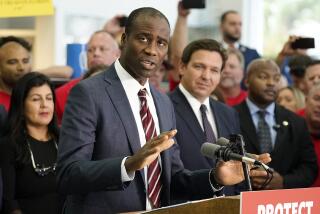Politics by Polls Led Us Astray
- Share via
The world has changed forever. That’s what everyone has been saying since Sept. 11. In many ways, it’s obviously true: Who would have thought that opening your mail without a hazmat crew standing by would qualify as risky behavior?
But some things, apparently, remain impervious to suicide hijackings, bioterrorism or even patriotism. Like, for instance, the media’s indestructible infatuation with meaningless opinion polls--and, far more ominously, our political leaders’ continued reliance on polls as their primary means of making policy decisions.
Take the latest numbers, which show President Bush enjoying a 92% approval rating. Or, as Cokie Roberts gushed on “This Week”: “Franklin Roosevelt didn’t hit this level.”
But even the pollsters admit that, as the fine print in this week’s ABCNews/Washington Post poll put it, “results of overnight polls that attempt to measure opinions about fast-changing news events should be interpreted with extra caution.” In other words, the results are meaningless.
Or worse. Take this week’s startling--and widely reported--finding that 83% of Pakistanis side with the Taliban in the current conflict. It was, we were told by Newsweek, CNN and assorted pundits, the result of a Gallup poll.
Trouble is, it was “Gallup Pakistan,” a dubious organization with no ties to the well-known U.S. polling company.
But even if media outlets had not been warned by the real Gallup Poll’s reliability, shouldn’t they have been skeptical of such an outrageous number and asked how the pollsters had gotten it? Had they stopped by an anti-U.S. demonstration? Or had they randomly called any Pakistani who had recently purchased an American flag and some lighter fluid?
Instead, the media turned a blind eye to Gallup’s “grave concerns” about the poll’s reliability and reported it as fact.
This willingness to just tout the numbers is standard operating procedure for both pundits and politicians; it’s a habit with often disastrous consequences.
Back in May 2000, a Zogby International poll asked Americans to name the most important issue facing the next president of the United States. Terrorism didn’t even crack the top 10. And so our always eager to please politicians led by following and allowed the safety and protection of the American people to slide.
Real leadership--one driven by vision, not polls--would have seen the iceberg lurking beneath the placid surface of our prosperity.
But tell that to our “leaders” in Congress, where Bush’s chart-topping approval has given him almost complete protection against criticism of his domestic agenda. The Democratic leadership has been cowed into silence, even as the president rides a Trojan horse filled with his highly partisan political agenda--drilling in the Arctic, building a missile shield, more corporate tax cuts--through the gate of this tragedy.
So the off-the-cuff reactions of a small sampling of randomly selected adults who didn’t have the good sense to hang up when the pollsters called have silenced a less-than-brave opposition. This despite the fact that history shows that even soaring approval ratings are, at best, highly ephemeral. All the president has to do is put in a call to his father, whose post-Gulf War 89% approval rating had an even shorter shelf life than the new Daniel Stern sitcom.
The terrorist attacks have laid bare, once again, the danger of having leaders who can’t even get dressed in the morning without consulting the latest poll numbers. And while the tragic events have clearly provided our 92% president with an aura of heroic leadership, they have also cast in high relief the deficiencies inherent in the system from which he sprang.
More to Read
Get the L.A. Times Politics newsletter
Deeply reported insights into legislation, politics and policy from Sacramento, Washington and beyond. In your inbox twice per week.
You may occasionally receive promotional content from the Los Angeles Times.










